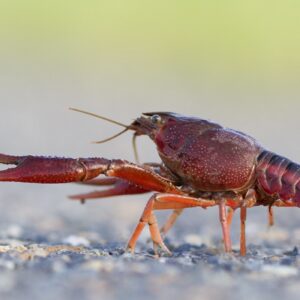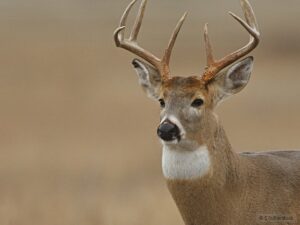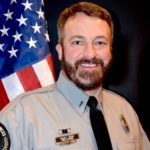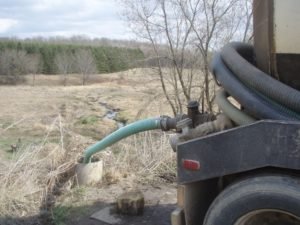An article from WWA’s Words From The Wardens.
This article originally appeared in Wisconsin Waterfowl Association’s February 2023 eNewsletter.
Happy New Year from the Investigations & Environmental Enforcement Section of the Wisconsin Department of Natural Resources (DNR)’s Division of Public Safety and Resource Protection.
If you are reading this and wondering, “What section?” I’m grateful to be able to brief Wisconsin Waterfowl Association membership on the type of work we do, as it fits perfectly with your association mission of waterfowl conservation and wetland protection.
Multifaceted Section Targets Invasives

Read about the fight against invasives like Red Swamp Crayfish here
The DNR warden position has evolved and expanded with the times to handle a wide range of public service duties.
The menu of services stemming from the Investigations & Environmental Enforcement Section includes Lt. Bob Stroess. As administrative warden of the Commercial Fish and Aquatic Species in Trade Enforcement Program, Lt. Stroess has managed investigations that have led to more than 200 convictions in cases involving the commercialization of illegal invasive species that can do serious and permanent damage to Wisconsin’s waters and native aquatic species and habitat – including wetlands.
Thanks to this record, the division successfully landed a grant to work on aquatic species in trade industries and the invasives in trade. This grant enables field wardens to join these investigations which are important to the health of the state’s waters and wetlands.
Illegal invasive species, when released into any waterbody, can multiply and overrun native species and destroy aquatic habitat and water quality. Acquiring funding sources from outside grants also ensures fidelity of your fish and game license dollars protecting wildlife in the field.
Deer Farms, Captive Wildlife And Wildlife Violator Compact
 If you’re a deer hunter, you are well versed in the state’s history with chronic wasting disease (CWD). Lt. Pete Dunn is the administrative warden who works with the state Department of Agriculture, Trade and Consumer Protection (DATCP) to inspect deer farms statewide. We check for fence integrity, CWD and follow up on farm-raised deer escapes.
If you’re a deer hunter, you are well versed in the state’s history with chronic wasting disease (CWD). Lt. Pete Dunn is the administrative warden who works with the state Department of Agriculture, Trade and Consumer Protection (DATCP) to inspect deer farms statewide. We check for fence integrity, CWD and follow up on farm-raised deer escapes.
Lt. Dunn also provides guidance to wardens who receive complaints about people suspected of keeping wild animals as pets. Sometimes well-intentioned people will find abandoned or sick wildlife and want to keep them for rehabilitation. Wild animals usually do their best when left alone, and much of our job is to educate the person holding the wildlife about the importance of leaving wildlife in the wild.
Working alongside Lt. Dunn is our program administrator, Summer Wilson. In addition to our statewide wild ginseng harvest case work, Summer also plays a significant role in her program by assuring that violators whose hunting or fishing privileges are suspended or revoked, stay that way.
Wisconsin participates in the Interstate Wildlife Violator Compact with 45 other states; each state honors their respective revocation of privileges stemming from poaching violations or sometimes failure to pay child support. This acts as a strong deterrent from overharvest of game and ensures fair chase.
Investigative Wardens And Environmental Enforcement Specialists On Duty
The section also is home to specially trained investigative wardens and environmental enforcement specialists. They work closely with our DNR field wardens and other DNR programs to investigate serious and intentional environmental violations.
The main goal is to help the violator comply with the law – and that comes with working with the responsible party in a respectful, step-by-step process. We call it our ‘stepped’ enforcement process. This works very well in most cases. Sometimes it’s a simple case of misunderstanding, and we can solve the pollution problem. However, there are some cases where it must be referred to the state Department of Justice for possible penalties.
Some examples of cases we investigate include alleged violations of intentional spills or pollution into waterways and wetlands. Cases can also include illegally held wildlife as in-home pets or in an illegal pet trade, commercial fishing, wetland fills and air pollution.
The mission of our investigative section seeks to create an even playing field by continuing to investigate individuals who perform pollution-related activities without DNR permits or licenses. Individuals who pollute outside of the DNR’s regulatory framework undercut legitimate licensed-businesses and give violators an unfair competitive advantage over companies who support a clean environment by investing in responsible waste disposal.
We continue to build relationships with external partners including U.S. Environmental Protection Agency and U.S. Fish and Wildlife Service, and routinely assist with cases that sometimes cross state lines.
Thanks For Your Teamwork
With support from our other agency partners and the public like you, our investigative section has prioritized clean drinking water, water quality and air pollution cases for citation or referral.
Our entire division appreciates the partnership and support from Wisconsin Waterfowl Association members. We share the mission to keep our resources healthy and safe from violators and illegal species that can causes irreparable damages to our natural areas we hold so dear.
If you have a tip concerning a possible violation against our environmental or wildlife, please contact our DNR Violation Tipline and provide your confidential information. Trained staff will provide the tip to the appropriate division staff. You can call or text 1-800-TIP-WDNR or 1-800-847-9367. You also can provide a tip online.
Let’s makes 2023 safe, healthy and fun for all.


